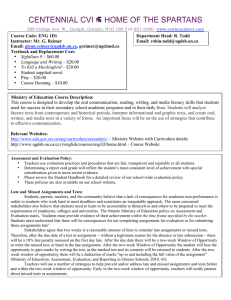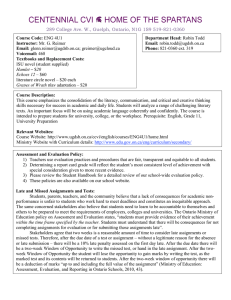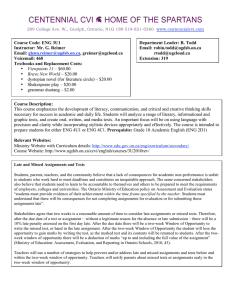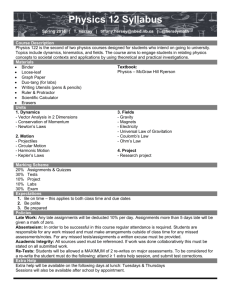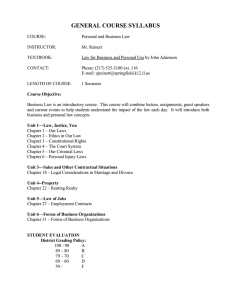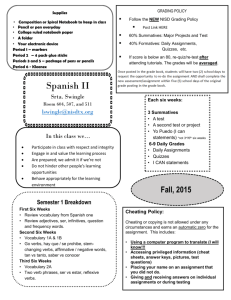Course Code: Department Head: Instructor: Email:
advertisement
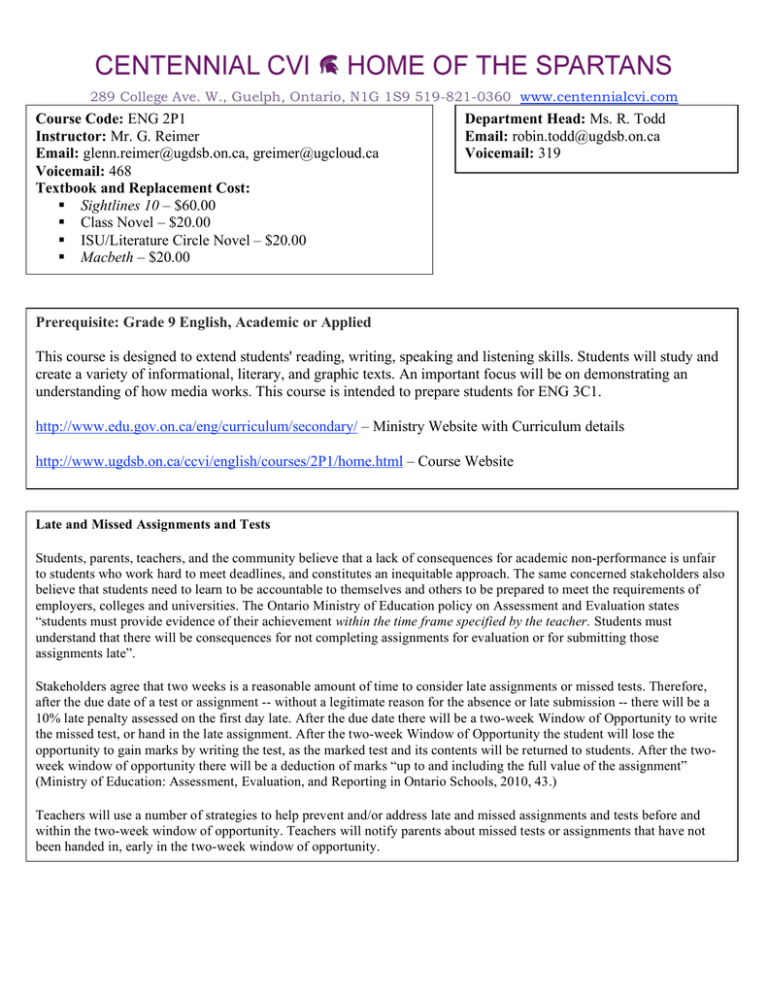
289 College Ave. W., Guelph, Ontario, N1G 1S9 519-821-0360 www.centennialcvi.com Course Code: ENG 2P1 Instructor: Mr. G. Reimer Email: glenn.reimer@ugdsb.on.ca, greimer@ugcloud.ca Voicemail: 468 Textbook and Replacement Cost: Sightlines 10 – $60.00 Class Novel – $20.00 ISU/Literature Circle Novel – $20.00 Macbeth – $20.00 Department Head: Ms. R. Todd Email: robin.todd@ugdsb.on.ca Voicemail: 319 Prerequisite: Grade 9 English, Academic or Applied This course is designed to extend students' reading, writing, speaking and listening skills. Students will study and create a variety of informational, literary, and graphic texts. An important focus will be on demonstrating an understanding of how media works. This course is intended to prepare students for ENG 3C1. http://www.edu.gov.on.ca/eng/curriculum/secondary/ – Ministry Website with Curriculum details http://www.ugdsb.on.ca/ccvi/english/courses/2P1/home.html – Course Website Late and Missed Assignments and Tests Students, parents, teachers, and the community believe that a lack of consequences for academic non-performance is unfair to students who work hard to meet deadlines, and constitutes an inequitable approach. The same concerned stakeholders also believe that students need to learn to be accountable to themselves and others to be prepared to meet the requirements of employers, colleges and universities. The Ontario Ministry of Education policy on Assessment and Evaluation states “students must provide evidence of their achievement within the time frame specified by the teacher. Students must understand that there will be consequences for not completing assignments for evaluation or for submitting those assignments late”. Stakeholders agree that two weeks is a reasonable amount of time to consider late assignments or missed tests. Therefore, after the due date of a test or assignment -- without a legitimate reason for the absence or late submission -- there will be a 10% late penalty assessed on the first day late. After the due date there will be a two-week Window of Opportunity to write the missed test, or hand in the late assignment. After the two-week Window of Opportunity the student will lose the opportunity to gain marks by writing the test, as the marked test and its contents will be returned to students. After the twoweek window of opportunity there will be a deduction of marks “up to and including the full value of the assignment” (Ministry of Education: Assessment, Evaluation, and Reporting in Ontario Schools, 2010, 43.) Teachers will use a number of strategies to help prevent and/or address late and missed assignments and tests before and within the two-week window of opportunity. Teachers will notify parents about missed tests or assignments that have not been handed in, early in the two-week window of opportunity. 289 College Ave. W., Guelph, Ontario, N1G 1S9 519-821-0360 www.centennialcvi.com Evaluation Requirements: The weighting of evaluated tasks throughout the course will reflect a balance of the following achievement categories: • knowledge and understanding (25%); • thinking (25%); • application (25%); • and communication (25%). The following tasks represent the evaluations that will form the student’s final grade. To earn an optimal grade, a student needs to complete each task. 1. Term Summatives: (70%) Assessments Unit One (Persuasion): Due Dates (approximate): speech week of February 9/15 character sketch week of February 23/15 persuasive paragraph week of March 2/15 newspaper article week of March 23/15 opinion paragraph week of March 30/15 essay week of April 20/15 Unit Three (Heroic Patterns): presentation/creative week of May 19/15 Unit Four (ISU/Literature Circles): creative & analytic elements week of June 8/15 Unit Two (Of Mice and Men): 2. Culminating Summatives: (30%) a. Argument/Articles, Presentation, Creative (unit four summatives) 15% b. Final Exam 15% Overall Learning Outcomes/Enduring Understandings for the course: 1. KNOW: The students will know a range of literary terms, literary texts, and strategies for decoding both fiction and non-fiction texts. 2. BE: The students will appreciate literature as a means of learning about themselves and the world around them and will become lifelong readers. 3. DO: The students will be able to analyze a range of fiction and non-fiction texts and will be able to express their ideas clearly and authentically both in their oral and their written work.
